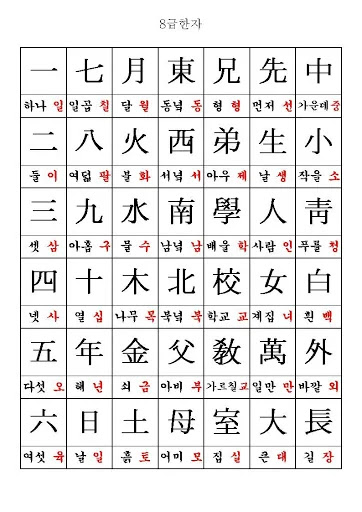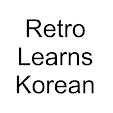Check out the related video:
What are 한자(漢字)?
Shortly after you begin studying you may come across the statistic that 70% words used in the Korean language are of Chinese origin. These were originally represented by Chinese characters. This logo graphic writing system was invented thousands of years ago and have continuously developed as more concepts needed to be expressed.
Initially only used by the higher classes due to lack of public education. In the current age it is easy for many in the developed world to spend time on learning the characters due to an abundance of information and resources available via the internet.
The ability to read the characters and Korean ability are completely unrelated. While the meaning that the character represents is still present, actually being able to recognise the characters is would be like learning the Greek alphabet to learn English. It will have zero affect on your ability to read, understand or converse in Korean.
As you learn more words you will slowly be able to pick up a lot of meanings, especially hanja that are used in many words. Being able to link words together that use similar meanings is the biggest advantage we can gain from a small amount of study.
As an example the hanja 적, present in a few words such as 해적, 산적, 의적 AND 도적, if we know the meaning of these 4 words we can likely deduce the meaning of 적 has something to do with stealing or thievery. We can use the meanings of the hanja to help us better remember words but also gain a better understanding of the meanings of words.
 |
| Hovering the 한자 in dictionary entries will give you the meaning |
But Chinese and Japanese people learn Korean quicker.
Yes this is true. They also use hanzi and kanji to read on a daily basis but what about Vietnamese? They too can learn Korean quicker than non Sino-language natives but you will notice the vast majority cannot read Chinese characters yet they still have an advantage. Many people likely draw the same false observation. The reason Japanese and Chinese natives can learn Korean at a faster pace is due to the sino words themselves being deeply embedded into their soul.
Almost all of the words used in Korean are also used in other sino languages and many have very similar pronunciation with mandarin being the outlier. Compare the words 해적 and kaizoku, they're just similar enough that once you learn the differences between pronunciations that you can pick up words very quickly.
We can experience this phenomenon ourselves if we look at romance languages. Each language will contain a set of 'native words' but once we get onto Latin origin words we can feel the same power that sino based natives can feel learning Korean. Lets look at a few words tranquillo, invitare, détester, we can easily figure out their meanings due to their similarities with English words.
 |
| Many words are shared between Latin based languages as with Sino based languages |
So what should YOU do?
My first advice would be to have awareness of words that use the same hanja, there are a few tools you can use koreanhanja.app where you can search for words that use the same hanja although the database is lacking. On any dictionary you use, bar physical, you will have the ability to see the hanja that is used and its meaning, usually revealed by hovering over it, you will see the hanja meaning and pronunciation it will be displayed in the format of 사람 인, 사람 being the meaning and 인 being the pronunciation.
I would also suggest some deliberate study of the meanings. For a quick overview of some important hanja I recommend howtostudykorean's guide which covers 200 common hanja. Recently however I found a book aimed at native koreans for them to learn the characters which contains a lot of information such as how they are put together and a lot of important hanja that may be harder to understand the meaning of just by seeing them in the few words they exist in.
Therefore I recommend the 날로 먹는 한자 series for those that would like to add more deliberate study of hanja into their routine but I would suggest not spending too much energy learning the characters as it will always be a sidestep on the path to learning Korean.
 |
| Example taken from 날로 먹는 한자 1 |
So there's no reason to learn the characters ever?
For the average learner I don't believe there is enough to gain by spending time on reading the characters although there are still few reasons one might learn the characters:
1. You will and are 100% that you are going to learn Chinese or Japanese at some point in the future.
2. It is something you want to be able to do.
3. You want to be a lawyer and are determined to work in korea
There are many reasons one would want to learn to read Chinese characters and as long as you understand that it will not improve your understanding of Korean to read the characters, you may occasionally come across them in news headlines as it takes up less space to write 日, 美, 北, 英, 中, 佛, 靑, 文 over writing the full word and using the hanja makes the meaning obvious as a simply syllable in Korean can represent a native word or 10 different Hanja.
 |
| News articles mentioning from YTN news 미국(美), 일본(日) and 중국(中) |
For related posts please check out these pages:
- How to Start Reading in a Foreign Language
- Anki Decks for Korean Learners
- Talk To Me In Korean Book Review and Thoughts on the Curriculum
- The Role of Listening in Language Learning
- The Role of Grammar Study in Language Learning
- The Monolingual Transition and How to Approach it
- Lingo Mastery's 2000 Most Common Korean Words in Context Review
- The Role of Anki in Language Learning
- How to Master the Korean Number Systems
- Korean Dictionary Symbols Explained
- The Best Vocabulary Books for Korean


No comments:
Post a Comment
Share your thoughts on this topic